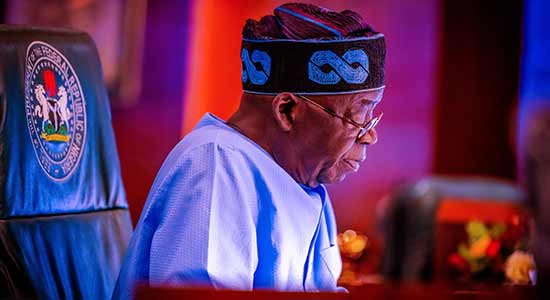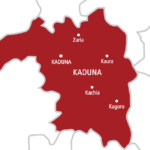On 19 May, following the establishment of the Presidential Committee on Climate Action and Green Economic Solutions, President Bola Tinubu appointed his spokesman, Ajuri Ngelale, as the Special Presidential Envoy on Climate Action (SPEC).
The president equally empowered the SPEC office to be the country’s lead negotiator on climate-related matters, the lead negotiator on the carbon market and management initiatives, the supervising interface between the Secretariat of the National Council on Climate Change (NCCC) and the NCCC Supervising Council and to also serve as the coordinator of all climate action-related activities in ministries, departments, agencies, legislative, and subnational entities.
While the presidential committee is expected to coordinate and oversee the country’s policies and programmes on climate action and green economic development locally and internationally, the assigned tasks overlap and conflict with the country’s existing Climate Change Act provisions. The law was put in place in 2021 by Mr Tinubu’s predecessor, Muhammadu Buhari.
Section 3(1) of the act establishes Nigeria’s Climate Change Council (NCCC). It bestows the NCCC with the power to formulate policies and make decisions on all climate change matters in Nigeria.
- Bandits kill 5 villagers in Kaduna
- BECE Exam: Private schools back cancellation of leaked paper in Edo
A PREMIUM TIMES review of Nigeria’s Climate Change Act indicates that President Tinubu’s directive allows the SPEC to hijack the responsibilities of the country’s NCCC director general as enshrined in the 2021 Climate Change Act.
Mr Tinubu also approved the appointment of Nkiruka Maduekwe as the Director General/Chief Executive Officer of the NCCC in an interim capacity, pending the confirmation of her appointment by the NCCC Supervisory Council.
Ms Maduekwe’s appointment, though yet to be ratified, came less than two weeks after Salisu Dahiru, the sacked Director General of the NCCC, and his team were tasked to represent Nigeria at the United Nations Bonn Climate Change Conference SB 60, billed for 3-13 June in Germany.
By implication, Mr Dahiru, who was the NCCC pioneer DG appointed by Mr Tinubu’s predecessor and who would have completed two years in office by July, would be unable to serve his four-year tenure as stipulated by the act.
The recent appointments and directives made by the president on climate matters have sparked debates among climate change experts who questioned the rationale behind the president’s decision at a time when the country requires individuals with deep knowledge and wide experience around climate negotiations to represent the country at the global stage to achieve green growth and sustainable development in the country.
Some experts who spoke with PREMIUM TIMES argued that rather than the president constituting committees and bodies with similar functions and roles, strengthening the NCCC with the statutory mandate to perform its roles/functions would be much better and cost-effective.
Others expressed concerns about Mr Ngelale’s experience and capacity to lead Nigeria’s climate negotiations and deliver on the country’s climate change target as enshrined in the Nationally Determined Contribution (NDC) document submitted to the United Nations Framework Convention on Climate Change (UNFCCC).
Nigeria’s Climate Change Act
During the 26th edition of the UN Climate Change Conference (COP26) held in Glasgow (Scotland) in 2021, former President Muhammadu Buhari announced a 2060 net-zero emissions target.
Barely a week after the conference, Mr Buhari signed the Climate Change Act 2021 into law. It was ratified and passed by the National Assembly in October 2021.
The act provides a legal framework for achieving low Greenhouse Gas (GHG) emissions and mainstreaming climate change actions into national plans and programmes.
Apart from the establishment of the NCCC which has the power to make policies and decisions on all matters relating to climate change in Nigeria, the act also provides that the NCCC will collaborate with the Federal Inland Revenue Service (FIRS) to develop a mechanism for “carbon tax and carbon trading” in Nigeria.
The proceeds from these, among other funds, will be used to fund the Climate Change Fund proposed by the act.
Some of the council’s powers, provided in Section 4 of the act, include coordinating the implementation of sectoral targets and guidelines for regulating GHG emissions and other causes of climate change, approving and overseeing the implementation of the Action Plan and administering the Climate Change Fund established under the act.
The act also mandates the NCCC to recommend legislative, policy, appropriation, and other measures for climate change adaptation, mitigation, and related activities.
Meanwhile, section 5(1) of the act details the council’s membership, which includes the President (Chairman), Vice President (Vice Chairman), Director General of the National Council on Climate Change (who shall be the Secretary), Ministers responsible for various sectors such as Environment, Petroleum Resources, Budget and National Planning, Justice, Mines and Steel Development, Finance, Agriculture and Rural Development, Power, Women Affairs, Transportation, Water Resources, and the Governor of the Central Bank of Nigeria etc.
However, members of the recently constituted Presidential Committee on Climate Action and Green Economic Solutions differ from the NCCC. The committee members include both statutory members of the NCCC and non-statutory members.
Nevertheless, the committee’s mandates overlap and conflict with the council’s functions. For instance, under section 4(j) of the Act, the council is empowered to collaborate with relevant ministries to develop and implement a carbon emission trading mechanism.
Similarly, the presidential committee is tasked with identifying, developing, and implementing innovative non-oil & non-gas climate action initiatives and collaborating with national governments and multilateral institutions to achieve the government’s climate action objectives and carbon market ambitions.
Legal insights
This overlap raises legal and moral questions about the necessity of the presidential committee when the NCCC’s statutory existence already covers these areas, argued Kazeem Oyinwola, an Abuja-based legal practitioner at Amofin Solicitors.
“If a 25-member Presidential Committee with similar mandates exists, what justifies the existence of the NCCC? What responsibilities remain for the NCCC?” Mr Oyinwola queried.
Additionally, Mr Oyinwola said the special presidential envoy’s role includes being the lead interface on engagement with the Central Bank of Nigeria, Federal Ministry of Finance, Federal Ministry of Power, Federal Ministry of Environment, and other critical institutions concerning the administration and coordination of climate-related donor finance, renewable energy finance, and green industrial growth management.
“These ministries are statutory members of the NCCC. So, what is the legal basis for a non-member of the NCCC to be the lead interface on engagement with the statutory members of the NCCC? What law empowers the president in that regard?” the lawyer argued.
Continue on www.dailytrust.com
Mr Oyinwola stated that the council is empowered under sections 4(a), (b), and (c) to coordinate the implementation of sectoral targets and guidelines for regulating GHG emissions, approve and oversee the implementation of the Action Plan, and administer the Climate Change Fund established under the act.
Meanwhile, the special presidential envoy’s terms of reference include being “the focal-point authority on all non-executive activities related to the operations of the NCCC, with delegated authority to oversee the activities and operations of the NCCC secretariat for frequent reporting to the President between meetings of the NCCC Supervisory Council.”
This, Mr Oyinwola said, suggests a special envoy would oversee a statutory body, “and what is now the role of the supervising council and what other responsibilities are left for the Director General of the Council to be doing?”
He emphasised that the roles and functions of the NCCC and its director general are spelt out in the Climate Change Act and that the creation of the presidential committee on climate change and the terms of reference of the special envoy issued by the president create overlaps and potential conflict.
Climate experts react
Speaking on the recent climate-related appointments/mandates by the president, Nnimmo Bassey, Director of the Health of Mother Earth Foundation (HOMEF), who has over a decade experience in COP negotiations, said, “What is unfolding from the presidency is very disturbing.
“It seems the government is seeing climate change as an avenue for transactional activities for private sector speculators.”
He added that naming a presidential envoy and setting up a committee with such wide-ranging powers shreds extant structures or renders them as lame ducks.
“It doesn’t seem as if there is a deep understanding that climate diplomacy or leadership requires experience and is not a ceremonial thing,” the environmentalist noted.
Regarding climate negotiations, Mr Bassey said the government cannot ignore the fact that a negotiator “must be hands-on during such moments as the climate COPs and the chief negotiator must be on hand at all times.”
“COPs are not project-seeking arenas or ones for signing MoUs as we often see,” he added, saying Nigeria cannot suddenly wake up with a structure that, to all intent and purpose, turns both the National Climate Change Commission and the Ministry of Environment into mere appendages.
“It appears the government wishes to dive into transactions in the name of climate change action. We see this both in the so-called green economics slant and the Evergreen industrial idea,” Mr Bassey told PREMIUM TIMES in an interview.
However, he said, naming a commercial entity to lead and make decisions on the proposed green industrial zone is very disturbing as that may eclipse the controls that should lie in related agencies.
Mr Bassey said the government is signalling a plan to treat climate change as an avenue to seek grants, promote financial speculation, and put people at greater risk.
On his part, Sulaimon Arigbabu, HEDA Resource Centre’s executive secretary, described the president’s appointment and the enormous powers and responsibilities being invested in the office of a special envoy on climate change as “worrisome” in many regards.
He said the move is a disruption of the little semblance of structure in Nigeria’s climate governance regime after many years of advocacy and clamour.
“The powers being vested in the Special Envoy simply erodes the NCCC. We had expected that the president would consolidate and give life to the NCCC to be the country’s clearing house on climate policies and governance, but this is not the case,” he added.
Equally, Mr Arigbabu said the special envoy’s appointment and stated roles cause confusion in the polity for all stakeholders within and outside Nigeria.

 Join Daily Trust WhatsApp Community For Quick Access To News and Happenings Around You.
Join Daily Trust WhatsApp Community For Quick Access To News and Happenings Around You.


